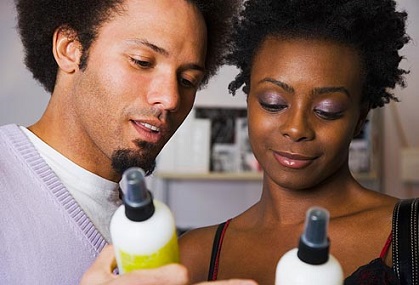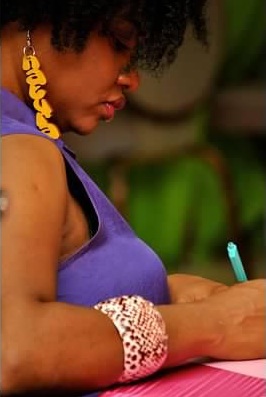 Everything
in life carries its lessons, in fact life itself often has a very steep
learning curve. The challenges faced can be tough, but usually with experience
and attention to detail, they can be overcome. Then, they become the
springboard for propelling you to the highest level. Natural hair is no
different. Most naturals, on the onset of their journey, become confused and
frustrated because they have little or no knowledge of how to maintain hair in
its natural state.
Everything
in life carries its lessons, in fact life itself often has a very steep
learning curve. The challenges faced can be tough, but usually with experience
and attention to detail, they can be overcome. Then, they become the
springboard for propelling you to the highest level. Natural hair is no
different. Most naturals, on the onset of their journey, become confused and
frustrated because they have little or no knowledge of how to maintain hair in
its natural state.
The truth is that many of us fail, and not only once, but
multiple times along the way and are sometimes forced to start all over, in an
attempt to get it right. There is so much to learn, and the lessons donít
always come overnight, instead they come through a series of trial and errors,
bits and pieces of information are grasped gradually. Eventually, this leads to
the art being mastery minimized frustration.
The
process of learning a lesson generally involves making mistakes or discovering that
results donít quite turn out as anticipated. From using products that weigh
down the hair to detangling hair in its dry state, from over manipulating your
strands to failing to protect your hair at nights, the list of painful mistakes
are endless. Thankfully, for every mistake made there is a lesson learned, some
however are learned the hard way and can have irreversible effects in the short
run.
The aim is not to try to take it in
all at once or try to perfect errors immediately. Itís all about baby steps,
gradually learning lessons along the way as they come. I certainly didnít get
everything right the first time, in fact, whenever there is a failed attempt at
a natural hair process or style, it often takes research and repeat attempts in
order to get it right.
Here are 3 major lessons that I learned personally, some of which were simple and easy to overcome while others were more difficult and caused major setbacks in my natural hair journey:
1. Failure to follow instructions on product labels can be detrimental.
 I
think many naturals may not realize the potential dangers associated with
misapplying products. Directions on the product containers are there as a guide
to instruct you as to how to achieve the best results. Failure to follow that
guide could result in failure to achieve the desired style or even worse, cause
unnecessary damage to your hair. One of the most common ways in which we misuse
products as naturals is by allowing conditioners to sit on our hair for hours
on end. We want to get that deep, deep down kind of penetration going on with
our strands. It seems to make a lot of sense that the longer the conditioner is
allowed to sit, the softer the hair becomes.
I
think many naturals may not realize the potential dangers associated with
misapplying products. Directions on the product containers are there as a guide
to instruct you as to how to achieve the best results. Failure to follow that
guide could result in failure to achieve the desired style or even worse, cause
unnecessary damage to your hair. One of the most common ways in which we misuse
products as naturals is by allowing conditioners to sit on our hair for hours
on end. We want to get that deep, deep down kind of penetration going on with
our strands. It seems to make a lot of sense that the longer the conditioner is
allowed to sit, the softer the hair becomes.
News Flash!!! That is not always
the case. I learned that lesson the hard way after getting carried away and
leaving my conditioner to penetrate my strands for approximately eight long
hours. Sometimes the delay in rinsing product from the hair is not intentional,
household chores or other pressing tasks at times take precedence and before
you realize it hours have passed.
Most
conditioners are pretty safe if left on for long periods but protein based
conditioners may not be. Protein used in large doses or kept on the hair for
long periods can have a drying effect. There is something called protein
overdose, although it is most likely to occur with thicker or coarser hair
types.
My
personal experience with product misuse ended up costing me 6-7 inches of hair.
I got carried away using four different products from a line that had protein
listed as a main ingredient. I allowed the conditioner to sit for many hours
while I tried to complete my chores. Upon rinsing my hair I noticed that
instead of feeling soft and moisturized, my hair felt dry and brittle. I
proceeded to style with the products from that same line, which I later
realized had protein. I was certain that after washing my hair on my next wash
day it would feel normal again but to my dismay there was no such luck. The dry
brittle texture was there to stay and I used loads and loads of moisturizing
conditioner on my hair to try and reverse the effects but the damage was
already done. I was left with no other recourse but to gradually cut off the
protein damaged hair.
This was a lesson I wish I didnít have to learn because it caused a one year set back in my hair journey. I have since read every single detail on every single label and learned to not deviate one dot or tittle from the prescribed instructions. Protein is not bad for the hair unless it is misapplied. Your monthly treatment is fine if it is applied and rinsed as intended. Learn from my mistake, donít overdo it.
2. Repeated use of heat can damage your hair.
I
know I must sound like a scratched record or some kind of anti-heat activist.
Trust me, if you learned my lesson you would feel the same way, too. Iíve said
it before and I will say it againÖ..heat is the enemy. Take my foolish advice,
if you love your natural hair texture and donít wish to permanently alter it
then avoid using heat. Let me make the disclaimer at this point that I am not
advocating against the use of heat all together. I am, however, sharing the
fact that it is proven that the repeated use of heat on a consistent basis will
cause structural damage not only to the outermost layer of the hair called the
cuticle layer but also to the innermost layer referred to as the medulla.
The
heat is intended to temporarily break the bonds of the hair shaft allowing it
to become straight. If heat is not used
properly however, it can cause the bonds to permanently break, making it more
difficult or sometimes impossible for the hair to revert to its natural
texture. Using heat at very high temperatures or without a heat protectant
leaves you at risk for heat damage.
During
my transition, I wore weaves as my protective style. This required me to
straighten a small section of my hair which was left out to cover the tracts.
This frequent straightening to ensure that my hair blended well with the
straight weave hair resulted in my demise. I soon realized that the section of
hair refused to revert and it took on the characteristics of hair that is
chemically processed. By the time I realized what was happening, the damage was
already done. I was faced with the scary truth, I had become a victim of heat
damage. I know it was as a result of the frequency with which it was done and
possibly other factors but as traumatized as I was, until this day I am still apprehensive
about using heat. So when I do use it,I approach it with utmost care. Letís
just say, I think I learned my lesson.
3. Natural hair is fragile and requires gentleness.
 One
of the biggest myths about natural hair is that it is very strong and can
withstand lot of wear and tear. We figure that because it looks more voluminous
than it did during our relaxer wearing days, it is an indication that it has
more resistance to manipulation. That is so not the case. I have heard so many
snaps and pops from my hair strands that itís not even funny. The kinky, coily
or curly texture of natural hair makes it easily tangled and matted and more
susceptible to breakage.
One
of the biggest myths about natural hair is that it is very strong and can
withstand lot of wear and tear. We figure that because it looks more voluminous
than it did during our relaxer wearing days, it is an indication that it has
more resistance to manipulation. That is so not the case. I have heard so many
snaps and pops from my hair strands that itís not even funny. The kinky, coily
or curly texture of natural hair makes it easily tangled and matted and more
susceptible to breakage.
When handling natural hair, if patience is not a trait that is displayed, your hair will pay the price for it. The popular idiom that says haste makes waste certainly holds true in this scenario. It is better to dedicate time and energy into diligently working through your hair, preferably in sections, than to rush through the process and cause damage.
Not
only should special care be exercised when manipulating natural hair but also
ensure that proper tools are being used. If a close-tooth comb is used to
detangle hair there will be more likelihood of experiencing hair loss or breakage.
Opt instead, to use a wide-tooth comb or better yet your fingers to prep and
style your hair. My biggest recommendation is to try not to do hair processes
that require high manipulation when you are strapped for time. This usually
results in shortcut methods being applied and lack of care being observed when
attending to those precious strands. Wash day is especially crucial as it
involves your hands being in your hair. Being hasty may prevent you from paying
attention to detail.
I
have lost many strands unnecessarily because of the mistake of presuming that
my natural hair can withstand the pressures and the man-handling. If your goal
is to maintain a nice full head of hair, then be sure to be very gentle and
treat each valuable strand with care and respect.
As
earlier mentioned, mistakes are inevitable. There is no one individual who gets
everything right on the first try. Take each failure however, as a lesson that
can be learned from and one that will contribute to your becoming a better
person as a result of it. Every setback is a chance for a comeback, just make a
physical and mental note of what works and what doesnít and this will pave the
way for you to experience a very fulfilling natural hair journey.

Candie's Natural Hairnamix was birthed a few months after Jamaican native Rossette "Candie" Allen began her natural hair journey in May 2010. She gears this column toward naturals, transitioning naturals, aspiring naturals and the naturally curious, sharing experiences, expertise and experiments while celebrating emancipation from chemical slavery.

